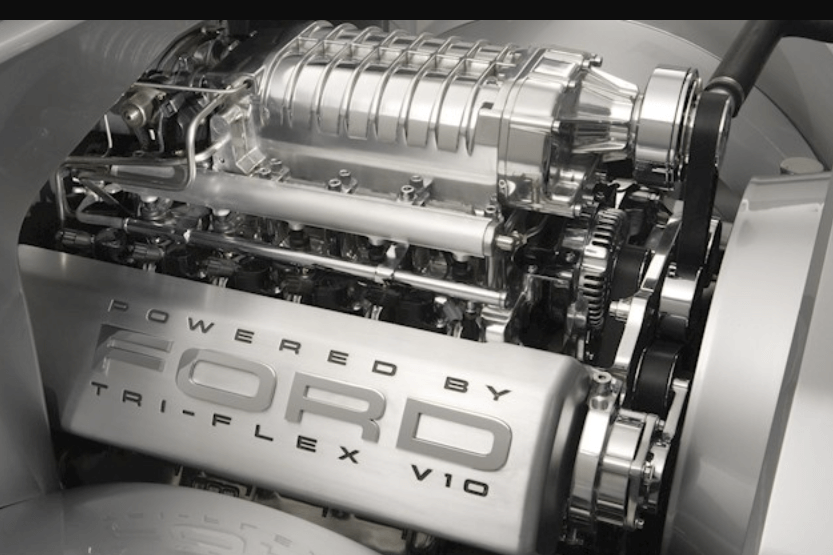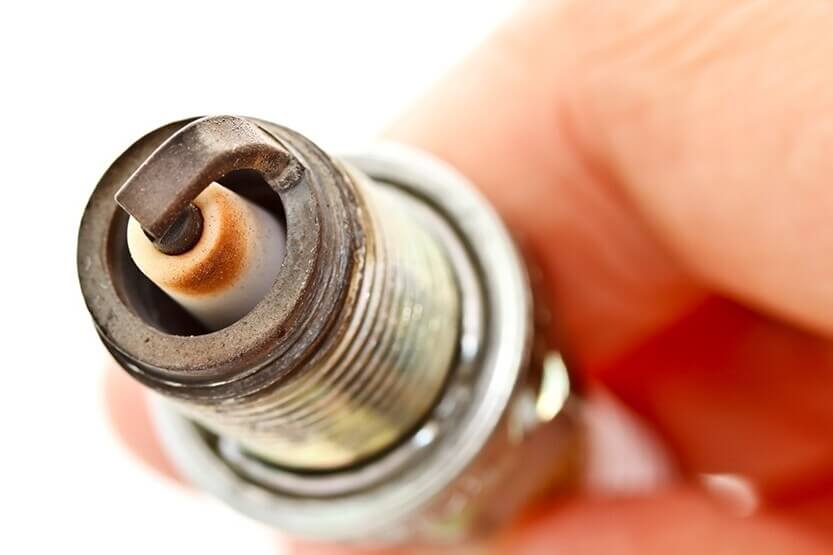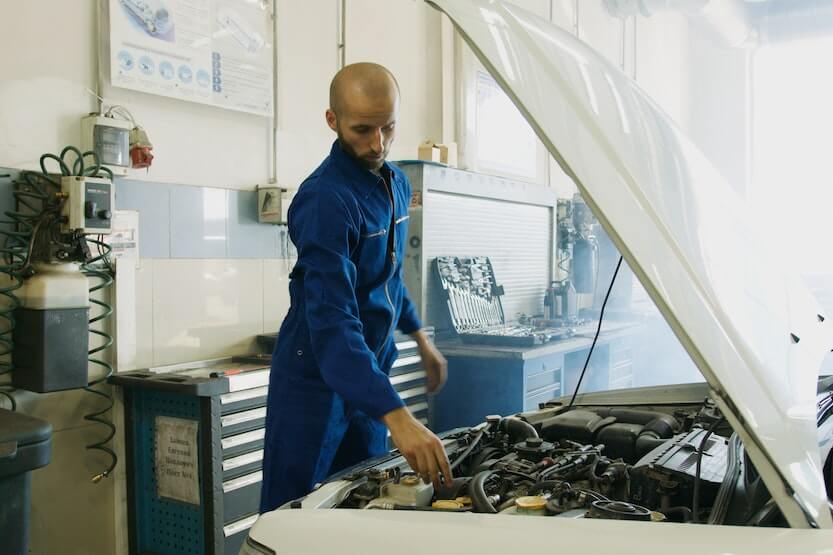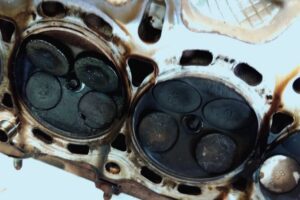The Ford V10 engine has been a popular choice for those looking for a powerful and reliable engine for their trucks or RVs.
However, not all years of the Ford V10 have been created equal. Some years have had more problems than others, which has led to a reputation of being unreliable.
In this article, we will explore the Ford V10 years to avoid and the common problems that have plagued these models.
The Ford V10 Engine: An Overview

The Ford V10 engine, also known as the Triton V10, is a gasoline-powered engine that was introduced in 1997 as part of the modular engine family. It was designed to be a more powerful alternative to the 7.5-liter engine that was used in Ford’s heavy-duty trucks. The V10 engine has been used in a variety of Ford vehicles over the years, including the F-Series trucks, the E-Series vans, and the Excursion SUV.
The V10 engine is a 6.8-liter engine that has 10 cylinders arranged in a V-shape. Each cylinder has two valves, which means that the engine has a total of 20 valves. However, some later models of the engine had three valves per cylinder, which increased the total number of valves to 30. The engine is designed to be powerful and capable of towing heavy loads, which makes it a popular choice for commercial vehicles.
While the Ford V10 engine is generally considered to be a reliable engine, there are some years that are best avoided. Some models of the engine, particularly those released before 2000, had issues with the spark plugs. The spark plugs had a tendency to eject from the engine, which could cause the engine to stall or even fail completely. This issue was particularly prevalent in the earlier models of the engine, but it was largely resolved in later models.
Despite this issue, the Ford V10 engine is generally considered to be a reliable and powerful engine. It has been used in a variety of Ford vehicles over the years, and it remains a popular choice for those who need a powerful engine for towing or hauling heavy loads. If you are considering purchasing a vehicle with a V10 engine, it is important to do your research and choose a model that has a good reputation for reliability.
Years to Avoid
When it comes to the Ford V10 engine, there are some years that are more problematic than others. Here are the years to avoid and some of the common problems associated with them.
Specific Model Years
According to Four Wheel Trends, the Ford Triton V10 models that should be avoided are those from 1995-2003 and the 2017 model. The early years of the V10 engine had issues with bad spark plugs, exhaust leaks, fluid leaks, and poor fuel economy. The 2017 model had problems with the cam phaser and timing chain, which caused engine failure in some cases.
On the other hand, the 2004-2010 models are generally considered to be more reliable. The 2004 model had some issues with the spark plugs, but Ford addressed this problem in later years. The 2005-2010 models had improved heads and more horsepower, making them a better choice for those looking for a reliable V10 engine.
Common Problems and Issues
One of the most common problems with the Ford V10 engine is the issue of spark plugs blowing out of the cylinder head. This problem was most prevalent in the early years of the engine, but it can still occur in later models. To prevent this problem, it is recommended to use a torque wrench when installing spark plugs and to replace them at regular intervals.
Another issue with the V10 engine is the tendency for the exhaust manifolds to crack or warp. This can cause exhaust leaks, which can lead to poor engine performance and increased emissions. To prevent this problem, it is recommended to use high-quality exhaust manifolds and to have them inspected regularly.
Finally, another common issue with the V10 engine is the tendency for the cam phaser and timing chain to fail. This problem was most prevalent in the 2017 model, but it can occur in other years as well. To prevent this problem, it is recommended to have the cam phaser and timing chain inspected regularly and to replace them if necessary.
In conclusion, if you are in the market for a Ford V10 engine, it is important to be aware of the years to avoid and the common problems associated with this engine. By doing your research and taking preventative measures, you can ensure that your V10 engine runs smoothly and reliably for years to come.
Performance and Reliability
The Ford V10 engine has been a popular choice for many car enthusiasts, truck drivers, and RV owners. It is known for its power and torque, but not all model years are created equal. Some V10 engines have had reliability issues, while others have been more dependable.
The best years for the Ford V10 engine in terms of performance and reliability are the 2005 to 2010 model years. During this time, the V10 engine had a horsepower output of approximately 362 and a torque output of 457 lbs.-ft. The 3-valve design of these engines also contributed to improved fuel economy, although the V10 still consumed more fuel than smaller engines.
On the other hand, the worst years for the Ford V10 engine are the models released before 2000. These engines were not as reliable and did not deliver the required power. Some of the common problems with these engines include issues with the spark plugs, exhaust manifold bolts, and PCV valve hose.
Despite these issues, the Ford V10 engine has a strong reputation for durability and longevity. With proper maintenance, these engines can last for many years without any major problems. It is important to regularly check and replace the spark plugs, as well as keep up with routine maintenance to ensure the engine’s longevity.
In summary, the Ford V10 engine has had some good and bad years in terms of performance and reliability. The best years for the engine are the 2005 to 2010 model years, while the worst years are the models released before 2000. With proper maintenance, the Ford V10 engine can be a reliable and long-lasting option for many car enthusiasts, truck drivers, and RV owners.
Common Problems with the Ford V10

The Ford V10 engine is a powerful unit that has been used in various vehicles, including trucks, RVs, and vans. However, it is not without its fair share of problems. Here are some of the most common problems that owners of Ford V10 engines have reported:
- Spark Plug Issues: One of the most prevalent engine-related issues with the Ford V10 is with spark plugs. Many owners have reported that the spark plugs tend to break off inside the cylinder head, causing misfires and compression loss. This problem is more common in the early models of the engine, particularly those manufactured between 1997 and 2003.
- Exhaust Manifold Leaks: Another common problem with the Ford V10 engine is with the exhaust manifold. Many owners have reported that the manifold tends to crack or warp, causing exhaust leaks. This problem is more common in the later models of the engine, particularly those manufactured between 2004 and 2010.
- Poor Fuel Economy: The Ford V10 engine is not known for its fuel efficiency. Many owners have reported that their vehicles equipped with this engine tend to have poor gas mileage. This problem is more common in the earlier models of the engine, particularly those manufactured between 1997 and 2003.
- PCV Hose Problems: The PCV hose is another component that tends to fail in the Ford V10 engine. Many owners have reported that the hose tends to crack or break, causing vacuum leaks. This problem is more common in the later models of the engine, particularly those manufactured between 2004 and 2010.
- Fluid Leaks: The Ford V10 engine is also known for its tendency to develop fluid leaks. Many owners have reported leaks from the valve covers, oil pan, and other components. This problem is more common in the earlier models of the engine, particularly those manufactured between 1997 and 2003.
Overall, while the Ford V10 engine is a powerful unit, it does have its fair share of problems. Owners should be aware of these common issues and take steps to address them as soon as possible to avoid more significant problems down the line.
Maintenance and Upgrades

To keep a Ford V10 engine running smoothly, regular maintenance is essential. This includes changing the oil, checking the spark plugs, and inspecting the exhaust manifold for any signs of corrosion or leaks. Regular maintenance not only ensures the engine runs smoothly but also helps to prevent more costly repairs down the line.
Upgrading the exhaust manifold is a common modification for Ford V10 owners. The factory exhaust manifold is known to have issues with stripped threads and corrosion, which can lead to exhaust leaks. Upgrading to an aftermarket exhaust manifold can help prevent these issues and improve overall engine performance.
When upgrading the exhaust manifold, it is important to also replace the gaskets. The factory gaskets are known to fail, leading to exhaust leaks. Upgrading to high-quality aftermarket gaskets can help prevent this issue and ensure a proper seal.
Another common upgrade for the Ford V10 is to replace the factory spark plugs with high-quality aftermarket spark plugs. The factory spark plugs are known to have issues with breaking off in the engine, which can be a costly repair. Upgrading to aftermarket spark plugs can help prevent this issue and improve overall engine performance.
Overall, regular maintenance and upgrades can help keep a Ford V10 engine running smoothly and prevent costly repairs down the line.
Fuel Economy
When it comes to fuel economy, the Ford V10 engine is not known for its efficiency. The V10 engine is a gas-guzzler, and it’s not uncommon to see it getting poor gas mileage.
According to some owners, the Ford V10 engine can get anywhere from 6 to 10 miles per gallon (mpg) depending on the driving conditions. However, this is not the case for everyone, and some owners have reported getting up to 12 mpg on the highway.
It’s worth noting that the fuel economy of the Ford V10 engine can be affected by a number of factors, including the weight of the vehicle, driving habits, and the type of driving conditions. For example, towing heavy loads or driving in stop-and-go traffic can significantly reduce fuel economy.
If you’re looking for a fuel-efficient engine, the Ford V10 may not be the best choice. However, if you need a powerful engine for towing or hauling heavy loads, the V10 may be a good option.
Overall, it’s important to keep in mind that the Ford V10 engine is not designed for fuel efficiency. If you’re concerned about gas mileage, you may want to consider other engine options.
In summary, the Ford V10 engine is not known for its fuel economy and can get poor gas mileage. The fuel economy can be affected by various factors, including driving habits and conditions. If you need a powerful engine for towing or hauling heavy loads, the V10 may be a good option, but if you’re looking for a fuel-efficient engine, you may want to consider other options.
Towing and Hauling Capabilities

When it comes to towing and hauling, Ford V10 engines are known for their impressive capabilities. These engines are commonly found in heavy-duty trucks like the F-250 and F-350, which are designed to handle tough jobs.
The towing capacity of a Ford V10-powered truck can vary depending on the model and year. For example, a 2008 F-250 with a V10 engine can tow up to 12,500 pounds, while a 2019 F-350 with the same engine can tow up to 15,000 pounds. These numbers can change based on factors such as the type of hitch, transmission, and axle ratio.
Similarly, the hauling capacity of a Ford V10-powered truck can also vary. A 2010 F-250 with a V10 engine has a payload capacity of up to 3,760 pounds, while a 2015 F-350 with the same engine can carry up to 4,040 pounds.
In general, Ford V10 engines are a great choice for those who need to tow or haul heavy loads. These engines offer plenty of power and torque, making them ideal for tough jobs. However, it’s important to note that towing and hauling capacity can vary depending on the specific model and year of the truck.
If you’re in the market for a Ford V10-powered truck, it’s important to consider your towing and hauling needs. Be sure to check the towing and payload capacity of any truck you’re interested in, and make sure it meets your requirements. With the right truck and engine, you can tackle even the toughest jobs with ease.
Life Expectancy of the Ford V10
The Ford V10 is a reliable engine that can last for a long time with proper maintenance and care. The V10 modular engine can last for decades and cross 200,000 miles with ease, making it a popular choice for work vehicles. The secret to its reliability is the simple design, low power output, and application in work vehicles.
The mileage you get from a Ford V10 engine will depend on your personal driving skills and habits. Some people are harder on their vehicles through their driving skills. Therefore, it is essential to maintain your vehicle properly to get the maximum life expectancy from your engine.
Regular oil changes, tune-ups, and other maintenance tasks can help extend the life of your engine. It is also important to avoid overloading your vehicle, as this can put undue stress on the engine and cause it to wear out faster.
In general, the word is that with proper maintenance and care, you should be able to get about 200,000 miles on a Ford V10 with ease. Of course, your experience may produce slightly less than stellar results. However, the Ford V10 is known for its durability and longevity, making it a great choice for anyone looking for a reliable engine that will last for years to come.
To Summarize
Overall, the Ford V10 engine is a reliable engine with a good track record. However, there are some years that potential buyers may want to avoid. The 2002 and earlier models are known to have issues with spark plugs that can get stuck in the cylinder head or shoot out due to excess heat. The early models also tend to have problems with the exhaust manifold cracking.
If you’re looking for a Ford V10, it’s best to avoid the models released before 2000. The spark plug design flaw in the Triton V10 engine caused frustration for many drivers. The spark plug had a habit of ejecting, which would immediately kill power to the engine. In addition, the early models tend to have problems with the exhaust manifold cracking.
On the other hand, the 2005 and later models are generally considered to be the best years for the Ford V10 engine. These models have addressed the issues with the spark plugs and exhaust manifold, making them more reliable than the earlier models.
It’s important to note that even the best years for the Ford V10 engine may still have issues. Regular maintenance and upkeep are crucial to keeping any engine running smoothly. If you’re considering purchasing a Ford V10, it’s important to do your research and make an informed decision based on your specific needs and budget.

![Ford V10 Life Expectancy [How Many Miles Will It Last?] ford v10 life expectancy](https://roadsumo.com/wp-content/uploads/2021/06/ford-v10-life-expectancy-150x150.jpg)






![Read more about the article Crankshaft Position Sensor [Symptoms, Location, Replacement]](https://roadsumo.com/wp-content/uploads/2021/04/crankshaft-position-sensor-300x200.jpg)
